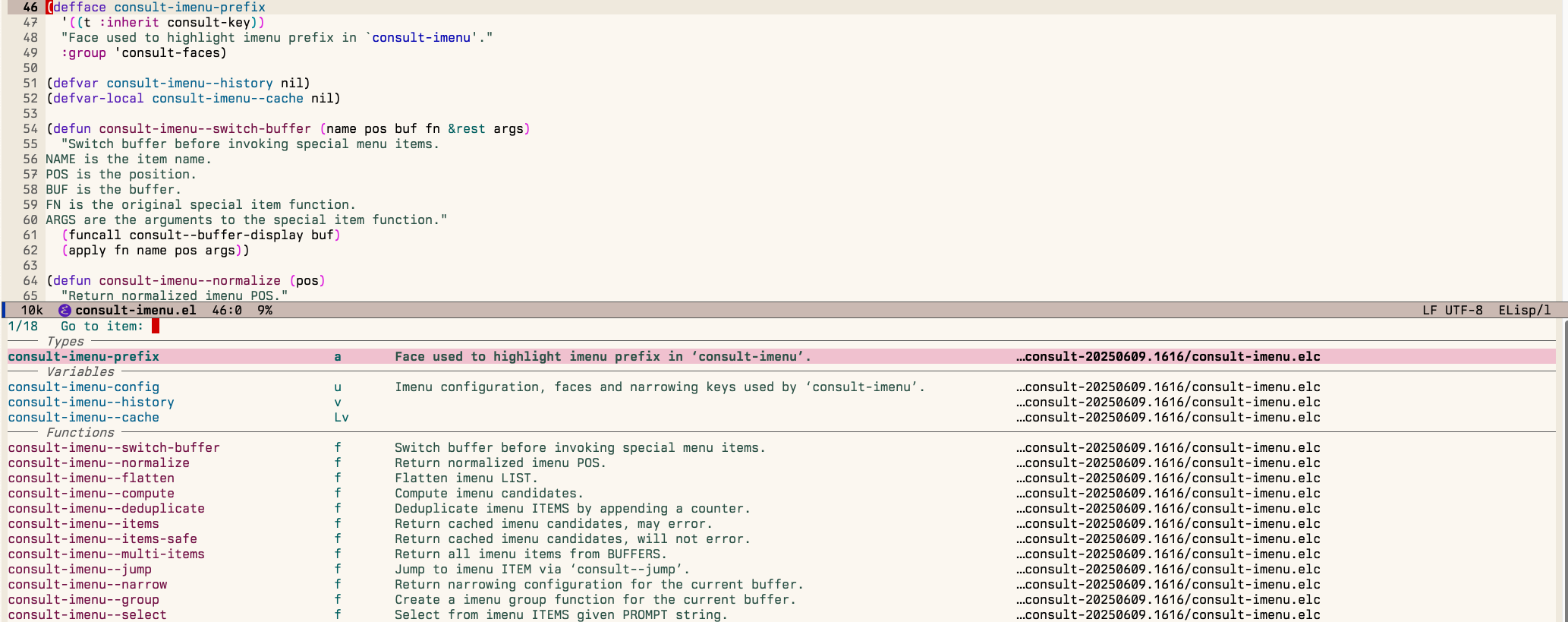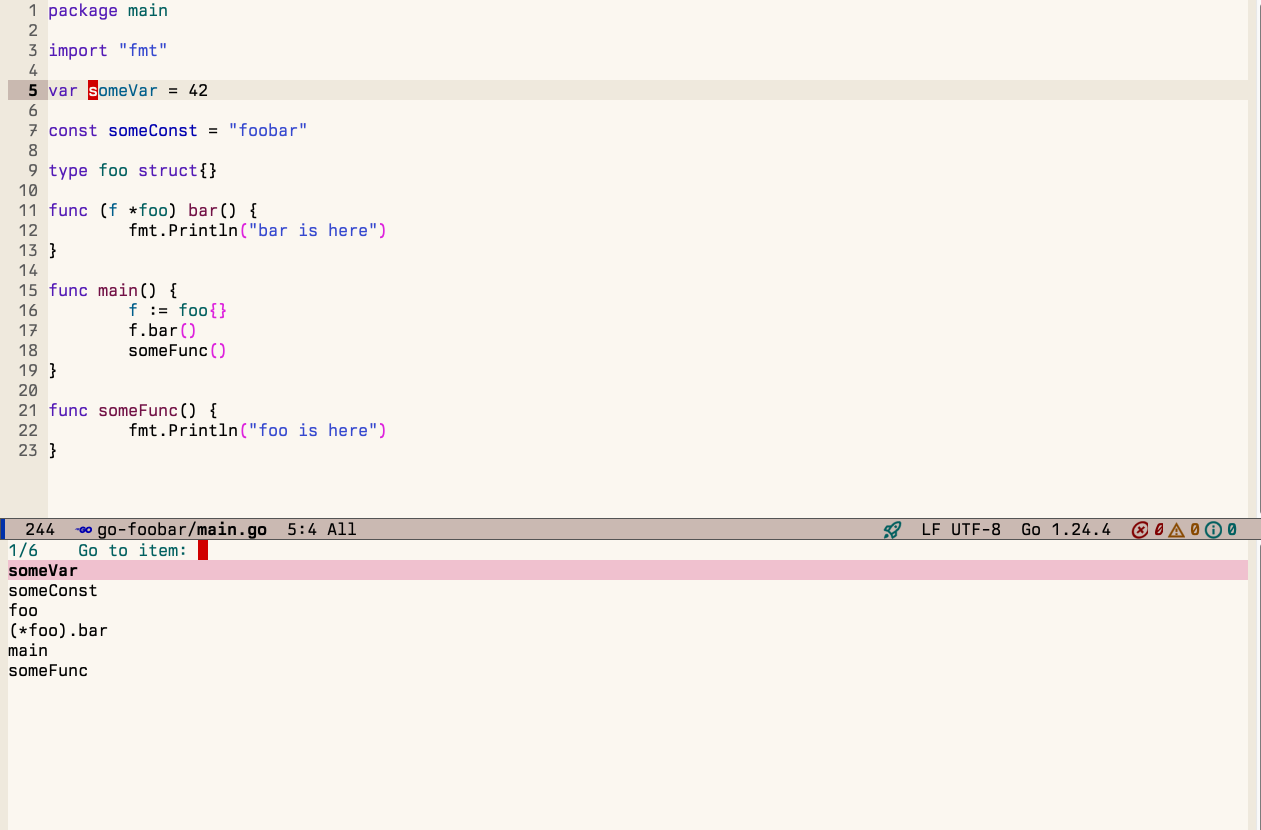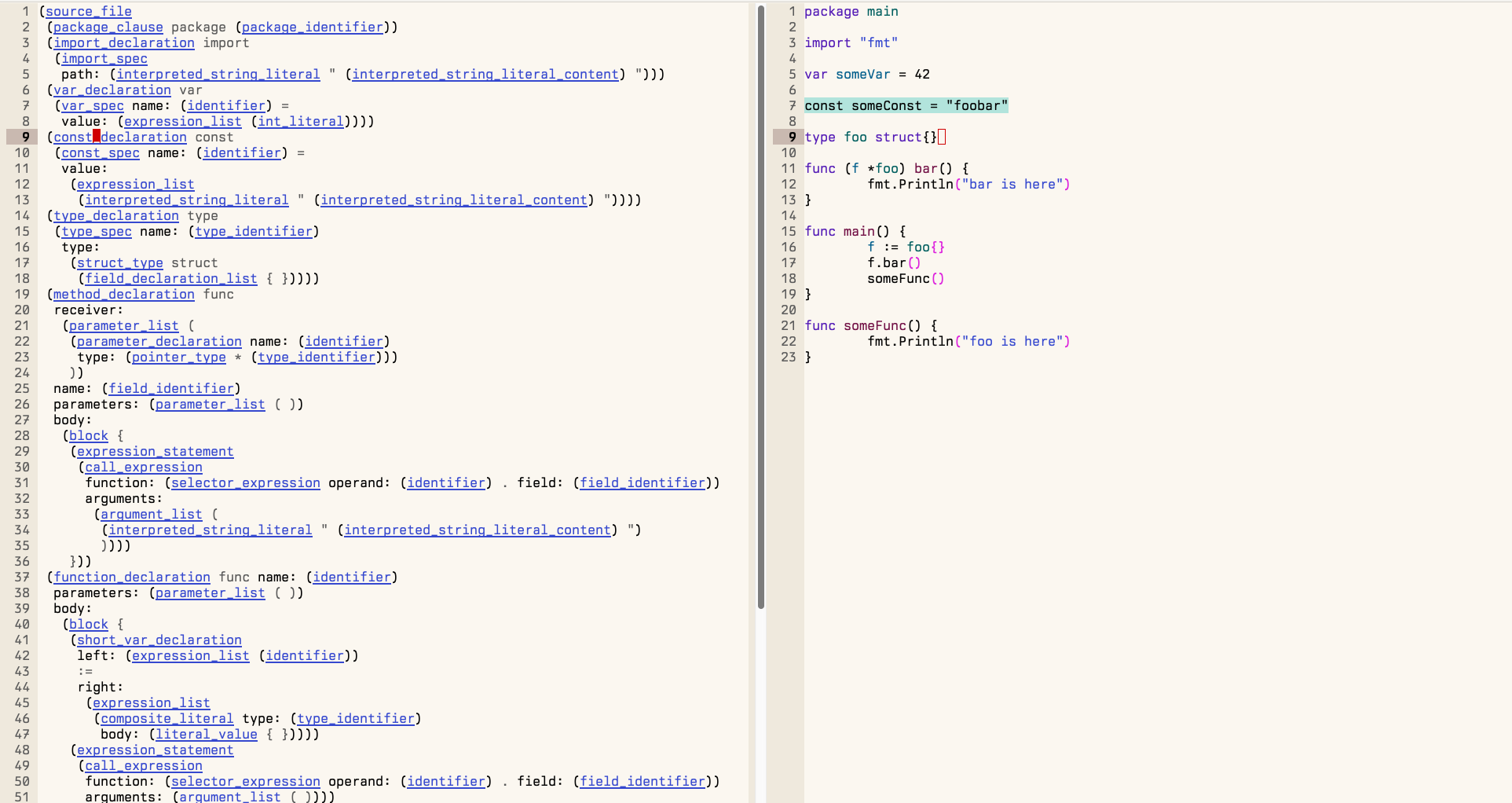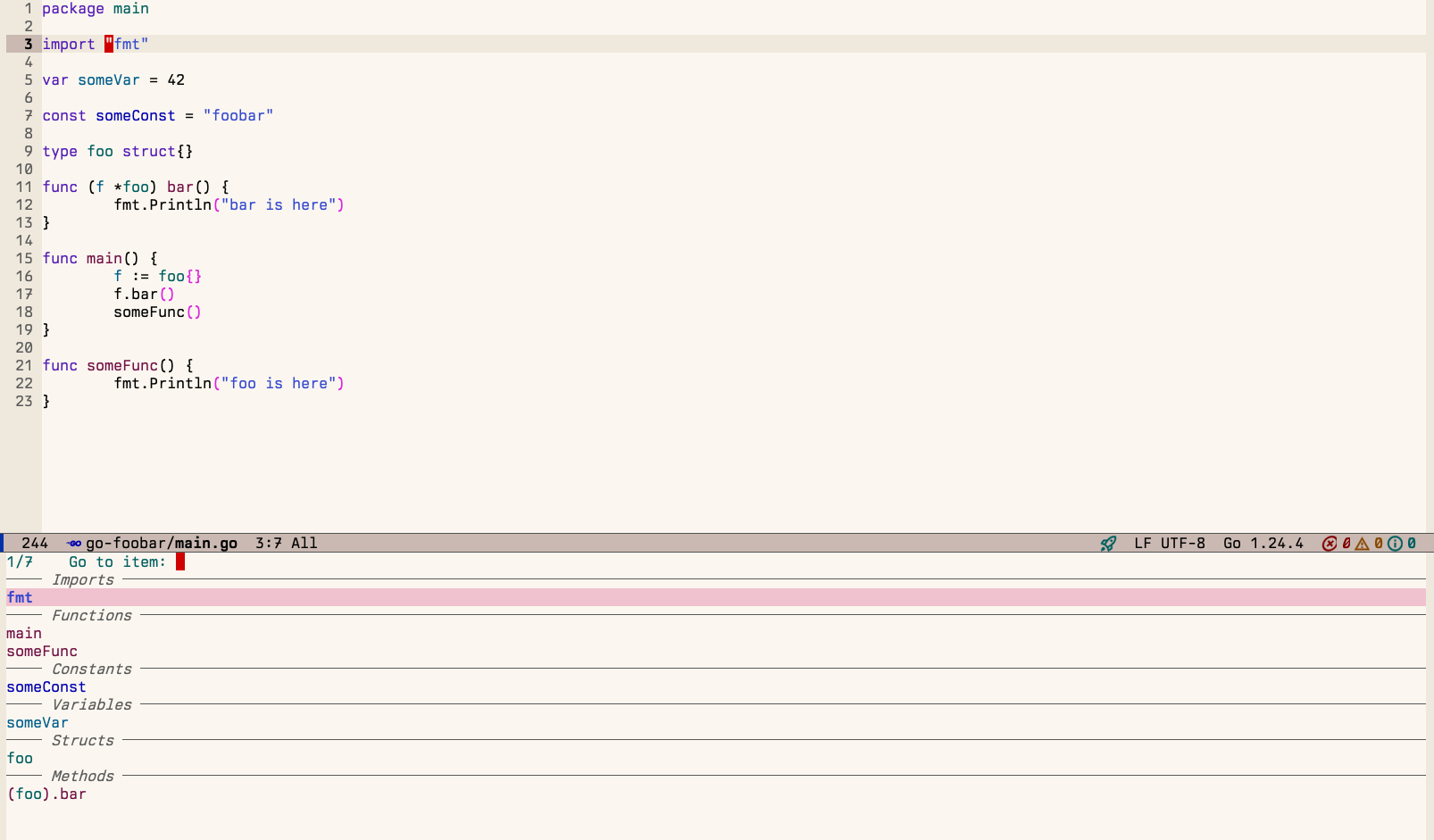Making Emacs and consult-imenu better with tree-sitter
Not long ago I have switched from lsp-mode to eglot and tree-sitter.
Approximately at the same time I’ve also moved from helm to vertico and the complementary packages for it such as marginalia, consult and orderless.
So far I’ve been pretty happy with the transition. eglot and vertico feel
snappy and more responsive than lsp-mode and helm. And marginalia is great
as well, because it provides nice annotations next to your completion
candidates.
Also, eglot is part of Emacs for quite some time already, and vertico (and
it’s complementary packages) build on top of the standard Emacs APIs such as
completing-read, which is another good reason to stick with them.
consult provides search and navigation
commands, and also comes with support for (amongst other things)
imenu
via M-x consult-imenu.
consult and marginalia pair nicely together. Here’s an example of M-x
consult-imenu displaying the symbols for an Elisp buffer, which look great. The
extra annotations next to each completion candidate are provided by marginalia
itself.
You get a nice menu with entries grouped by Types, Functions, Variables,
etc. You can also narrow down the search for entries of specific kind, e.g. when
you want to browse the functions only, simply type f SPC in the
consult-imenu prompt and it will give you the function definitions only.
At $WORK I’m primary working on Go code these days, and one thing I’ve noticed
when using M-x consult-imenu is that the results are less impressive when
compared to the Elisp code.
As you can see the results are nowhere near to what M-x consult-imenu
(enriched by marginalia) displays for Elisp code.
In this post we will see how to make M-x consult-imenu look better when
working with Go code (or any other language with tree-sitter support).
After some time spent on reading documentation and manuals I was not able to fix it myself, so I made a post at r/emacs asking whether someone else was having the same issues as I do. In the meantime I kept digging.
So, what turned out to be the issue for me, is that eglot provides it’s own
imenu-create-index-function
called eglot-imenu, which actually wraps treesit-simple-imenu, and
treesit-simple-imenu is tree-sitter’s approach to building the imenu index.
Here’s what the value of imenu-create-index-function looks like, when set by
eglot.
Use C-h v imenu-create-index-function (or M-x describe-variable imenu-create-index-function).
imenu-create-index-function is a variable defined in ‘imenu.el’.
Its value is
#f(advice eglot-imenu :before-until treesit-simple-imenu)
Local in buffer main.go; global value is
imenu-default-create-index-function
The function to use for creating an index alist of the current buffer.
It should be a function that takes no arguments and returns
an index alist of the current buffer. The function is
called within a ‘save-excursion’.
See ‘imenu--index-alist’ for the format of the buffer index alist.
Automatically becomes buffer-local when set.
This variable may be risky if used as a file-local variable.
My current tree-sitter configuration looks like this. Make sure to check How to Get Started with Tree-Sitter if you are just starting out with tree-sitter.
After configuring tree-sitter you should also install the language grammars
using M-x treesit-install-language-grammar.
;; tree-sitter settings
(use-package treesit
:config
;; Language grammars and sources
(setq treesit-language-source-alist
'((bash "https://github.com/tree-sitter/tree-sitter-bash")
(c "https://github.com/tree-sitter/tree-sitter-c")
(go "https://github.com/tree-sitter/tree-sitter-go")
(go-mod "https://github.com/camdencheek/tree-sitter-go-mod")
(json "https://github.com/tree-sitter/tree-sitter-json")
(python "https://github.com/tree-sitter/tree-sitter-python")))
;; Remap major modes to treesitter modes
(setq major-mode-remap-alist
'((go-mode . go-ts-mode)
(python-mode . python-ts-mode)
(js-json-mode . json-ts-mode)
(json-mode . json-ts-mode)
(sh-mode . bash-ts-mode))))
In order to make eglot stop messing with imenu we need to tell it so. My
current (simplified) eglot config looks like this.
Note that we are configuring eglot-stay-out-of in the :config section, so
that eglot doesn’t interfere with imenu index generation.
;; eglot settings
(defun eglot-format-buffer-before-save ()
(add-hook 'before-save-hook #'eglot-format-buffer -10 t))
(defun eglot-organize-imports-before-save ()
(add-hook 'before-save-hook (lambda ()
(call-interactively #'eglot-code-action-organize-imports))
nil t))
(use-package eglot
:ensure t
:init
(require 'company)
(require 'yasnippet)
(require 'go-mode)
:config
;; We want to use treesit-simple-imenu for imenu index creation
(add-to-list 'eglot-stay-out-of 'imenu)
;; Shutdown LSP server when last project buffer is closed as well
(setq eglot-autoshutdown t)
;; Enable eglot for the following modes
(dolist (mode '(go-mode-hook go-ts-mode-hook))
(add-hook mode 'eglot-ensure))
;; Buffer-local hooks which install before-save hooks
(add-hook 'go-ts-mode-hook #'eglot-format-buffer-before-save)
(add-hook 'go-ts-mode-hook #'eglot-organize-imports-before-save))
;; eglot-booster requires that `emacs-lsp-booster' is installed [1]
;; [1]: https://github.com/blahgeek/emacs-lsp-booster
(use-package eglot-booster
:ensure t
:after (eglot)
:config
(eglot-booster-mode 1))
And my (simplified) settings for go-ts-mode look like this.
;; Go specific settings
;; Help out the builtin project find the Go module path
(require 'project)
(defun project-find-go-module (dir)
(when-let ((root (locate-dominating-file dir "go.mod")))
(cons 'go-module root)))
(cl-defmethod project-root ((project (head go-module)))
(cdr project))
(add-hook 'project-find-functions #'project-find-go-module)
(use-package go-ts-mode
:ensure t
:config
(add-hook 'go-ts-mode-hook #'company-mode))
Instead of using eglot-imenu we will configure a hook for our
go-ts-mode which sets imenu-index-create-function to treesit-simple-imenu.
(add-hook 'go-ts-mode (lambda () (setq-local imenu-index-create-function #'treesit-simple-imenu)))
Later we will move this hook to the use-package definition for go-ts-mode.
Next, we need to tell treesit-simple-imenu how to generate the imenu
index. treesit-simple-imenu relies on treesit-simple-imenu-settings variable
when generating the imenu index.
treesit-simple-imenu-settings is a variable defined in ‘treesit.el’.
Its value is nil
Settings that configure ‘treesit-simple-imenu’.
It should be a list of (CATEGORY REGEXP PRED NAME-FN).
CATEGORY is the name of a category, like "Function", "Class",
etc. REGEXP should be a regexp matching the type of nodes that
belong to CATEGORY. PRED should be either nil or a function
that takes a node an the argument. It should return non-nil if
the node is a valid node for CATEGORY, or nil if not.
CATEGORY could also be nil. In that case the entries matched by
REGEXP and PRED are not grouped under CATEGORY.
NAME-FN should be either nil or a function that takes a defun
node and returns the name of that defun node. If NAME-FN is nil,
‘treesit-defun-name’ is used.
‘treesit-major-mode-setup’ automatically sets up Imenu if this
variable is non-nil.
Probably introduced at or before Emacs version 30.1.
By default the go-ts-mode.el defines treesit-simple-imenu-settings like
this.
;; Imenu.
(setq-local treesit-simple-imenu-settings
`(("Function" "\\`function_declaration\\'" nil nil)
("Method" "\\`method_declaration\\'" nil nil)
("Struct" "\\`type_declaration\\'" go-ts-mode--struct-node-p nil)
("Interface" "\\`type_declaration\\'" go-ts-mode--interface-node-p nil)
("Type" "\\`type_declaration\\'" go-ts-mode--other-type-node-p nil)
("Alias" "\\`type_declaration\\'" go-ts-mode--alias-node-p nil)))
The docstring of treesit-simple-imenu-settings shown above shows the structure
of the list. The second item in the each list as mentioned there is a regexp
which matches the type of the tree-sitter node.
When making any changes to treesit-simple-imenu-settings it is best that you
review the AST tree as you go by using M-x treesit-explore-mode.
This is what the AST looks like for our sample Go program.
So, after spending some time configuring treesit-simple-imenu-settings with
the help of M-x treesit-explore-mode here’s what my current config looks like.
;; Treesitter helpers to extract node names for various symbols such as consts,
;; vars, imports, etc.
(defun my/go-ts-var-is-global-p (node)
"Predicate which tests whether a `var_spec' node belongs to the global scope"
;; The parent node for `var_spec' which is `var_declaration' belongs to the
;; global scope, if the `var_declaration' node belongs to a parent node of
;; type `source_file'.
(let* ((var-declaration (treesit-parent-until
node
(lambda (item)
(string-equal (treesit-node-type item) "var_declaration"))
t))
(var-declaration-parent (treesit-node-parent var-declaration)))
(string-equal (treesit-node-type var-declaration-parent) "source_file")))
(defun my/go-ts-const-is-global-p (node)
"Predicate which tests whether a `const_spec' node belongs to the global scope"
;; The parent node for `const_spec' which is `const_declaration' belongs to the
;; global scope, if the `const_declaration' node belongs to a parent node of
;; type `source_file'.
(let* ((const-declaration (treesit-parent-until
node
(lambda (item)
(string-equal (treesit-node-type item) "const_declaration"))
t))
(const-declaration-parent (treesit-node-parent const-declaration)))
(string-equal (treesit-node-type const-declaration-parent) "source_file")))
(defun my/go-ts-const-spec-node-name (node)
"Returns the name of a `const_spec' node"
(let ((const-name (treesit-node-child-by-field-name node "name")))
(treesit-node-text const-name)))
(defun my/go-ts-var-spec-node-name (node)
"Returns the name of a `var_spec' node"
(let ((var-name (treesit-node-child-by-field-name node "name")))
(treesit-node-text var-name)))
(defun my/go-ts-import-node-name (node)
"Returns the name of a `import_spec' node"
(let* ((import-path (treesit-node-child-by-field-name node "path"))
(import-alias (treesit-node-child-by-field-name node "name"))
(package-name (treesit-search-subtree import-path "interpreted_string_literal_content")))
(cond
(import-alias
(format "%s (%s)" (treesit-node-text package-name) (treesit-node-text import-alias)))
(t (treesit-node-text package-name)))))
(defun my/treesit-simple-imenu-settings ()
(setq-local imenu-max-item-length 200)
(setq-local imenu-index-create-function #'treesit-simple-imenu)
(setq-local treesit-simple-imenu-settings
'(("Imports" "\\`import_spec\\'" nil my/go-ts-import-node-name)
("Functions" "\\`function_declaration\\'" nil nil)
("Constants" "\\`const_spec\\'" my/go-ts-const-is-global-p my/go-ts-const-spec-node-name)
("Variables" "\\`var_spec\\'" my/go-ts-var-is-global-p my/go-ts-var-spec-node-name)
("Interfaces" "\\`type_declaration\\'" go-ts-mode--interface-node-p nil)
("Types" "\\`type_declaration\\'" go-ts-mode--other-type-node-p nil)
("Aliases" "\\`type_declaration\\'" go-ts-mode--alias-node-p nil)
("Structs" "\\`type_declaration\\'" go-ts-mode--struct-node-p nil)
("Methods" "\\`method_declaration\\'" nil nil)))
(setq-local consult-imenu-config
'((go-ts-mode :toplevel "Imports"
:types ((?I "Imports" font-lock-constant-face)
(?f "Functions" font-lock-function-name-face)
(?c "Constants" font-lock-constant-face)
(?v "Variables" font-lock-variable-name-face)
(?i "Interfaces" font-lock-type-face)
(?t "Types" font-lock-type-face)
(?a "Aliases" font-lock-type-face)
(?s "Structs" font-lock-type-face)
(?m "Methods" font-lock-function-name-face))))))
What is left now is to add a hook for go-ts-mode, which configures everything for us.
My updated go-ts-mode config looks like this.
(use-package go-ts-mode
:ensure t
:config
(add-hook 'go-ts-mode-hook #'my/treesit-simple-imenu-settings)
(add-hook 'go-ts-mode-hook #'company-mode))
Here’s how it looks like with the sample Go program shown before.
Things look much better now. We have various categories such as Imports,
Functions, Variables, etc. And the index generation happens much faster now,
because it relies on tree-sitter only.



